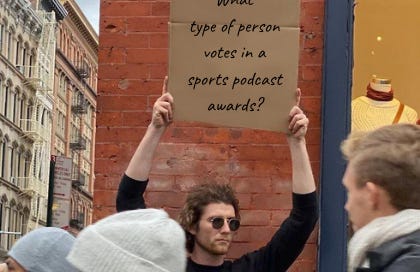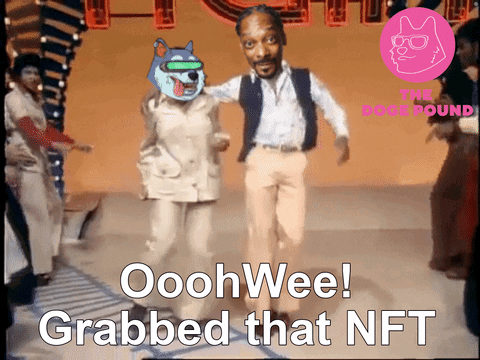Snoop's big Super Bowl NFT drop; StepUP to the job of the week; Too big to fail; Test cricket is fun too; Kurt Vonnegut on the Saudi golf league; Ugo Monye on jeopardy
The newsletter of the podcast
The edge v the middle
The sports business conversation is dominated by issues that are probably of marginal long term importance. We could cobble together a list - NFTs, Socios, DAOs, tokenisation of fan engagement..Some fads become fashion, some fashions become trends and some trends will actually stay on to become part of culture. But most fads don’t make that transition.
As Stewart Brand put it: “Fast gets all our attention, slow has all the power”.
Martin Wiegel has written a brilliant blog post:
A note of caution here. Appetite, energy, curiosity, and impatience ensure that youth culture is a hotbed of innovation and experimentation on the part of both its creators and consumers. However, we’d be well-advised not to treat ‘culture’ as being synonymous with and thus limited to youth culture. Or assume that by dint of proximity, youth confers a wholesale expertise on the topic of culture.
I really like ‘wholesale expertise’.
As a combination, sports marketing and venture capitalism are obsessed with fast over slow, and want to forget the middle, which is where most people are. (From the same piece):
The middle is where fame happens. Proper, your-mum-knows-about-it, fame.
The kind of fame where when you walk outside the office and ask people about it and they know what you’re talking about.
So much of what the advertising industry does now, if we’re honest, fails that most basic test.
Simply put, the numbers don’t back up the extent of our obsession with the outer edges. For every limited batch craft beer, there’s a lot of lager still drunk…for every new digital platform we coo over, Facebook remains, in effect, the whole internet for approaching half of all UK internet users.
The NFL and the Super Bowl are the middle.
The Premier League, FIFA, UEFA are the middle.
The IOC is the middle.
Love ‘em, hate ‘em, it will take a very long time before these are displaced.
Boring innit.
Platform economics: Snoop’s Guide to using the Super Bowl half time show to flog NFTs
Dan Runcie’s Tropical newsletter is really good on Snoop and the Super Bowl show.
This show felt like Roc Nation’s course correction after that Atlanta-based Super Bowl in 2019 featured Maroon 5 as the headliner. No disrespect to Adam Levine, but the NFL missed an opportunity to pay homage to Atlanta’s legacy in R&B, hip-hop, and soul. Jay Z and Roc Nation weren’t gonna let that opportunity slip by in LA.
But this was the eye opener on the money Snoop’s making from NFTs, using the Super Bowl as his own ad spot.
To celebrate the moment, Snoop dropped a new album on his newly-acquired label on Friday called B.O.D.R. Snoop’s new music may not top the Billboard charts, but as I wrote recently in my Spotify essay, it’s short-sighted to solely judge an album’s commercial success on the streams or “album-equivalent units” it sold for several reasons.
First, Snoop is not doing this for the money. He loves making music and being “Uncle Snoop” to the younger generation. Second, established acts and older artists can do much better with higher-end merch sales (e.g. Griselda), live shows, and NFTs.
As part of B.O.D.R’s release, Snoop released a Stash Box NFT collection in collaboration with Gala Music, a decentralized record company. He released 25,000 NFTs for $5,000 each (16,208 still available as of publishing). Each NFT includes one of the 17 tracks as an NFT. Owners who get all 17 tracks will be invited to private events, potential BBQs at Snoop’s house, a commemorative chain, other VIP benefits.
If we assume that the other 8,792 NFTs have already been purchased for $5,000 each, then that’s nearly $44 million in revenue generated from Snoop’s Stash Box NFTs that went on sale on Friday! The terms are undisclosed, but even if we conservatively assume Snoop’s cut is 50%, that’s still a tremendous payout. Do you know how many streams, merch sales, and concert tickets it would take to generate $44 million?! I’m not even gonna bother calculating.
It’s also a great way for Snoop to segment his superfans. He may not launch an NFT like this with every future album. But if there’s any week in his career to launch a project like this, it was this week.
Whisper it, test cricket is fun too
Listen to people talk about test cricket and you’d never know it’s an enduring and popular form of mass market entertainment. (UP226 How to market test cricket, with Mike Jakeman, Omar Chaudhuri and Tony Singh)
The prevailing narrative is that the long form game is hard work.
Whenever people are asked why they don’t like cricket, their answers mirror my own when asked about Call of Duty*: too long, too complex, can’t be bothered to learn the codes of language and behaviour that define me as an outsider and make me feel stupid.
* I've never been asked to record my views on Call of Duty.
** I’ve never been asked a research question of any kind.
The underlying message is that test cricket is better for you - it’s medicine - or that by spending time to educate yourself you’ll reap the deeper rewards - it’s a Russian novel or the opera.
But really, it’s a failure of marketing.
The popularity of Twenty20 has given cricket boards an excuse for not applying the principles of great marketing to the long form game.
T20, and more recently The Hundred, has created a them and us standoff, often laced with snobbery and intellectual pretension, between traditionalists and newbies.
The anti-CoD.
False narratives and story without jeopardy
The ICC’s solution to the test cricket marketing challenge is the ICC World Test Championship.
Spoiler: The ICC is an event business, so their answer to most questions is, another event.
The World Test Championship asks people who are bored by a day of test cricket to extend their indifference over two years.
Its defenders say the World Test Championship gives the game a narrative.
But…this misunderstands the n word.
Stories have consequences. There is jeopardy.
At this point I make no apology for dropping in Kurt Vonnegut’s talk on the shape of stories.
Look around and you’ll see sports marketing industry attempting to tell stories that go against Vonnegut’s rule; their chalk board has a straight line going upwards from bottom left to top right.
They do this because money doesn’t like risk, which is a business euphemism for jeopardy. The result is boring stories.
It’s not enough for England to drop to the bottom of the ICC Test rankings. They should be relegated. The punishment must hurt, beyond pride.
This is not possible, because England, Australia and India are too big to fail.
The Saudi-backed Premier Golf League is seeking to create a story with no jeopardy because after paying hundreds of millions to Phil Mickelson, Dustin Johnson and Bryson DeChambeau, these players will be too big to fail.
In rugby, five of the Six Nations are too big to fail. Italy aren’t, so CVC want to ditch them in favour of South Africa.
The Super League failed because it was a tedious idea based on the assumption that Real Madrid, FCBarcelona, Man Utd et al are too big to fail…and so it goes on.
For an insight in to the commercial value of jeopardy, listen to Ugo Monye from last week’s podcast, UP224.
Monye works for BT Sport covering Gallagher Premiership Rugby.
During the Covid hit 2020-21 season, the RFU announced they were scrapping relegation.
Ugo Monye: So often the story is at the bottom. And I can tell you for a fact, it impacted our broadcasting numbers every single week when that was announced…they lost all sense of jeopardy halfway through the season.
Interesting, no?
This is a thing we’re trying out.
If you’re hiring and want to advertise jobs via UP, get in touch with Sean@UnofficialPartner.co.uk
This week: Two Circles Wants You…
To play, rearrange these popular words and phrases:
Support the growth of….Rights Management team….Two Sales Leads….securing sponsorship deals….range of international clients…track record of securing premium sponsorship…..relevant B2B marketing partnerships.
Good luck.
Go deeper: The Business of Cricket
This week’s podcast is part of a series of cricket related podcasts:
Omar is a former guest on the podcast where we talked about jeopardy and the use of data to inform sporting formats - UP181 The Business of Jeopardy.
Also mentioned in the podcast is the excellent Sky Sports Ashes Vodcast, featuring Ian Ward, Mike Atherton, Nasser Hussain and Rob Key.
Our conversation with ECB CEO Tom Harrison is referenced, from May 2021. Hear that on UP161.
UP16 Ed Smith, former head England cricket selector and author.
UP50 We Need To Talk About Cricket with journalist Tim Wigmore.
UP 125 Rajasthan Royals franchise owner Manoj Badale on the lessons of the IPL
UP105 A New Innings, with Simon Hughes
UP5 From Packer to The Hundred, with Tim Crow and Derek Pringle






